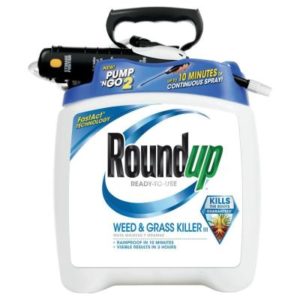 Glyphosate (found in Roundup and Ranger Pro) is the most heavily used herbicide (weed-killer) in the world, and its use has been steadily increasing in the past decade. The debate over whether the pesticide is carcinogenic (cancer-causing) or not has been going on for a while.
Glyphosate (found in Roundup and Ranger Pro) is the most heavily used herbicide (weed-killer) in the world, and its use has been steadily increasing in the past decade. The debate over whether the pesticide is carcinogenic (cancer-causing) or not has been going on for a while.
This week University of Washington researchers published a study that analyzed earlier studies about glyphosate herbicides (such as Roundup). They found that persons with higher exposure to glyphosate have a 41% increased chance of getting cancer, specifically non-Hodgkin lymphoma (NHL). This is huge. Of course, the manufacturer of Roundup (Monsanto and its owner Bayer) is going nuts trying to discredit the study, but the scientific evidence is clear.
Unfortunately many foods contain residues of glyphosate, the amounts found in foods are increasing, and as a consequence most of us (even pregnant women) have detectable levels of glyphosate in our bodies.
How to lower your exposure to Roundup or other glyphosate based herbicides? Don't use Roundup or other glyphosate-based herbicides in your yard or property. Try to eat as much organic food as possible. Glyphosate is NOT allowed to be used in organic farming.
Glyphosate residues are increasingly found in conventionally grown foods and in increasing amounts because so many crops grown are now "Roundup Ready" (can withstand the herbicide), and also due to preharvest (right before harvest) application of the herbicide on regular crops.
By the way, the US government is resisting testing for glyphosate residues in foods because of their insistence that it is "safe", so why test? (due to industry influence...)
The researchers of this study also mention research showing that glyphosate alters the gut microbiome, and that it may act as an endocrine disrupting chemical. In other words, there are a number of health concerns with glyphosate herbicides.
Excerpts from investigative journalist Carey Gillam's article in The Guardian: Weedkiller 'raises risk of non-Hodgkin lymphoma by 41%'
...continue reading "Study Finds That Popular Weedkiller Raises Risk of Cancer"
